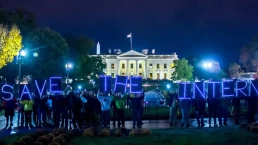While Americans might not mourn the loss of net neutrality, an appeals court’s ruling sets a troubling precedent for consumer protections in every industry.
By Brian Barrett, Wired
In the end, the return of net neutrality was short-lived: Today, the Sixth Circuit Court of Appeals struck down rules introduced by the Biden administration that would have prevented internet service providers from favoring some apps or websites over others. It’s the conclusion of a decades-long fight for a more equitable internet—and a harbinger of what may await other consumer protections in the years to come.
It’s easy to get lost in the technicalities of net neutrality, but the basic thing the Federal Communications Commission wanted was the power to prevent broadband providers from engaging in bandwidth discrimination, slowing speeds for certain customers or to certain sites. Those protections existed under the Obama administration but were rolled back shortly after Donald Trump took office in 2017. You probably won’t feel much near-term impact; we’re largely back to the status quo, and Spectrum is unlikely to immediately try slowing down YouTube to get you to watch its own cable news channels. But that’s also why the way the Sixth Circuit arrived at its decision may be even more alarming than the ruling itself.

The three-judge panel frequently cited Loper Bright Enterprises v. Raimondo, the recent Supreme Court decision that overturned a legal doctrine known as Chevron deference. Under Chevron, courts were required to defer to regulatory agencies when it came to deciding how relevant laws should be interpreted when their provisions were unclear. Now, courts are free to decide for themselves. And the Sixth Circuit did exactly that.
“Unlike past challenges that the DC Circuit considered under Chevron, we no longer afford deference to the FCC’s reading of the statute,” the ruling reads. “Instead, our task is to determine ‘the best reading of the statute’ in the first instance.”
In other words, the court substituted the subject matter expertise of the FCC with its own.
Recent Posts
New Addition to List of Nuclear Near Catastrophes
February 25, 2026
Take Action Now Debris flew for great distances — many times the distance of 270 meters to a nuclear reactor and nuclear storage facility.By David…
Gavin Newsom’s last budget belies his ‘California for All’ pledge
February 24, 2026
Take Action Now Yet, even as the state is poised to lose billions in federal funding, and millions of Californians are losing access to health care…
Israel and American Hawks are Pushing U.S. to Iran War With Catastrophic Consequences
February 23, 2026
Take Action Now At the World Health Assembly in May, member states may endorse an unprecedented strategy declaring that health is not a cost – but…
A Child’s View of the Attack on Venezuela. And a Peace Flotilla
February 23, 2026
Take Action Now Fabricio said that he and his family went out of their building and saw many people also going outside, running around, and kids…




